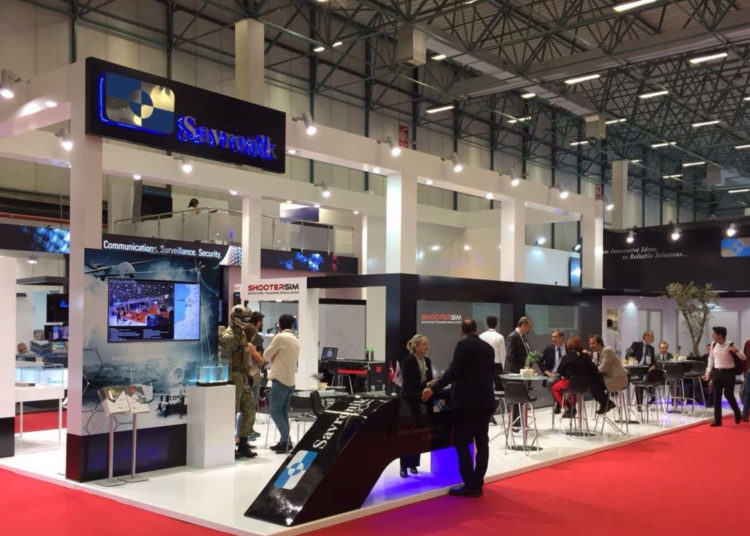Abdullah Bozkurt
Turkish defense contractor Savronik, a company that is also active in railways, highways, finance, renewable energy and other sectors, was investigated on allegations of tender-rigging in Turkey.
According to secret intelligence documents obtained by Nordic Monitor, the Ankara representative of Savronik, Ayşe Füsun Tunç, had been involved in a web of ties in the Turkish capital to rig government tenders and obtain favorable terms for contracts. A police memo submitted to the court stated that she was trying to manipulate tenders and secretly cooperating with other Turkish firms identified as military software specialist Milsoft Yazılım A.Ş., aviation firm Alp Havacılık A.Ş. and construction company Tubin İnşaat A.Ş. by exchanging documents and information.
The intelligence memo that details criminal activities engaged in by Savronik and others:
The police asked the court to authorize a wiretap for her phone in order to monitor her communications and map out her contacts as part of her criminal activities. Other suspects in the same tender-rigging network were listed as Ömer Faruk Ağa Yarman, then then-general manager of Air Electronics Industry (Havelsan), Asuman Vangölü, Mehmet Demir Çiğdemoğlu, Cem Koşmaz and Berna Alp.
Yarman was meeting with the owners of defense firms that would enter into bidding competitions for tenders and contracts, and he had been trying to get secret information from government officials on some contracts in violation of laws and regulations that govern the contracts. His pointman was Berna Alp, who was acting on behalf of Yarman and trying to get favors in exchange for information on contracts and tenders.
The court order authorizing wiretaps for Savronik employees and others:
Vangölü was accused of trying to obtain secret information about government contracts and tenders in advance through her contacts in the government. She had contacts with members of the commission that oversees tenders and contracts during the bidding process.
Çiğdemoğlu worked for Havelsan but acted on behalf of a private company called Emre Müşavirlik Kalibrasyon Turizm ve Dış Ticaret Ltd. Şti. He was trying to fix government purchase orders for goods and services, using coded messages in his discussions on the phone to avoid detection and often preferred to meet with contacts in person ahead of tenders.
Koşmaz was rigging the tenders on behalf of communications company Komturk İletişim Ltd Şti. He was bribing government officials and coordinating with the other companies participating in the bidding for government contracts.
Submission to the court by the Security General Directorate intelligence unit, which detailed information on the suspects:
The investigators first submitted the intelligence note about the suspects to the court on February 16, 2010, requesting wiretap authorization. Three more people — Meşhun Borkan Ağırkan, Yılmaz Çetin and Aykut Azgur — were included in the initial request, but their names were removed when the police filed for an extension to the wiretaps, suggesting that investigators ruled out their involvement in the criminal enterprise after monitoring their communications. Ankara 11th High Criminal Court judge Halit Dönmez granted the request for three months.
The extension was filed on May 14, 2010, and a third request was filed on August 11, 2010.
The intelligence branch forwarded some of the evidence collected from the wiretaps to the Smuggling and Organized Crime Unit (KOM) at the end of 2010. The KOM unit did its own preliminary investigation and decided to inform the public prosecutor about the criminal activities that were detected. In 2011 the Ankara Public Prosecutor’s Office launched a criminal investigation into the group, which was trying to manipulate tenders for the Undersecretariat for the Defense Industry (SSM) (later renamed the Presidency of the Defense Industry), Turkey’s top defense and military articles procurement agency.
The prosecutor’s office also secured warrants from the courts to wiretap Yarman, Tunç and others who were suspected of running an organized crime syndicate to rig government defense tenders.
Savronik continues to operate in the Turkish defense industry and gets awarded military contracts thanks to the political cover provided by the government of President Recep Tayyip Erdoğan. Instead of going after the crooks at Savronik who tried to manipulate tenders, the Erdoğan government punished the investigators who exposed the illegal activities in which Savronik and other firms were involved.












